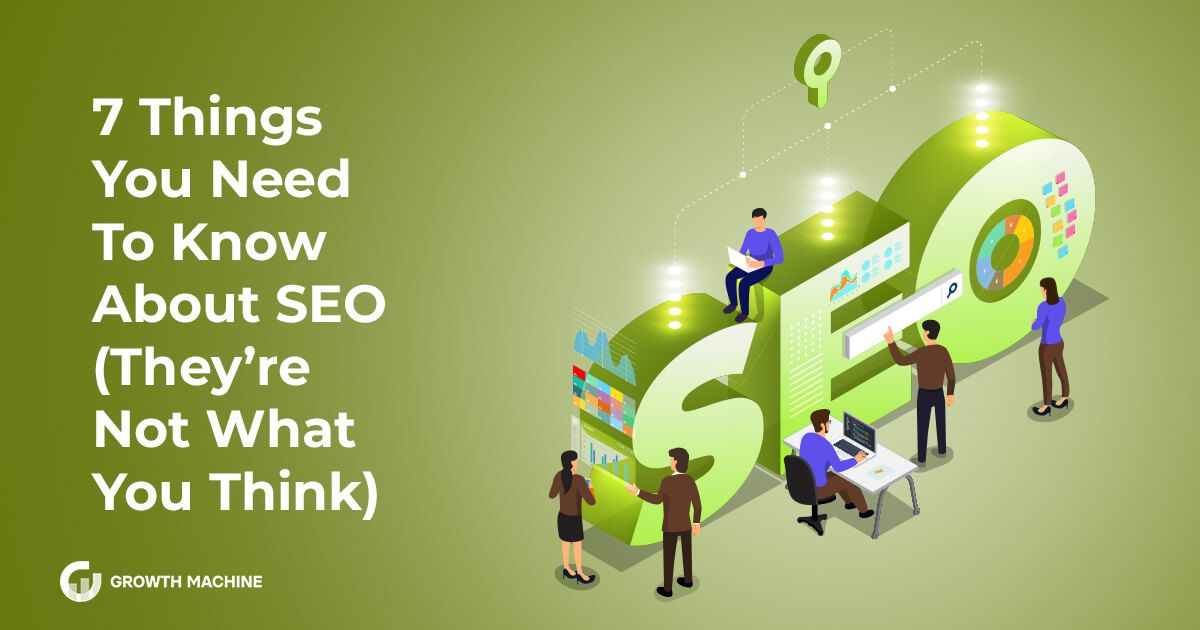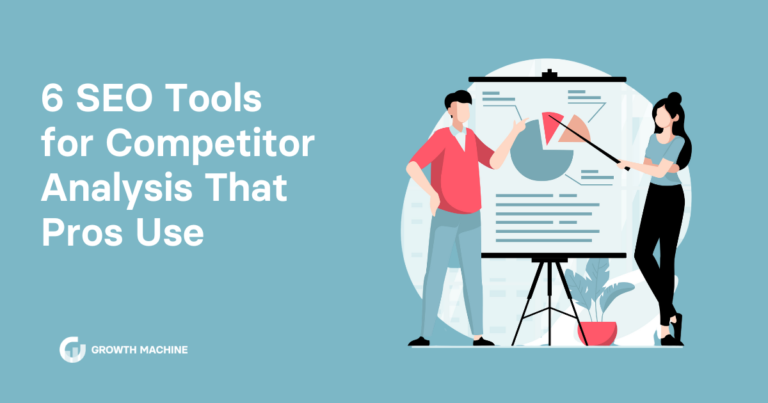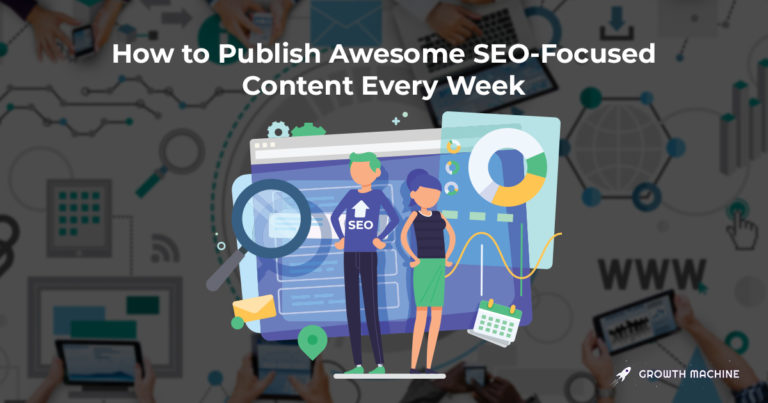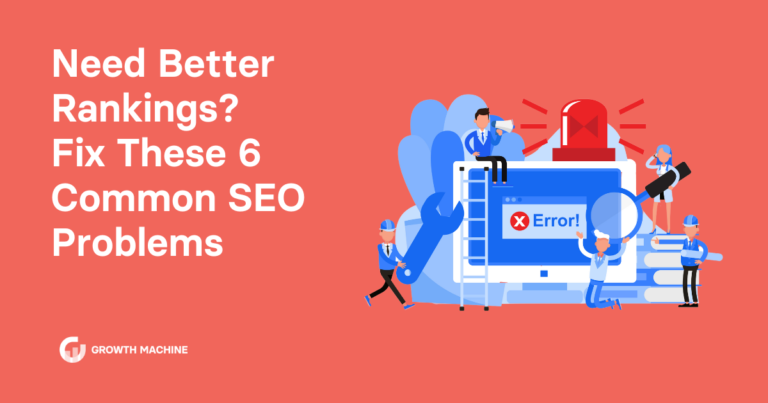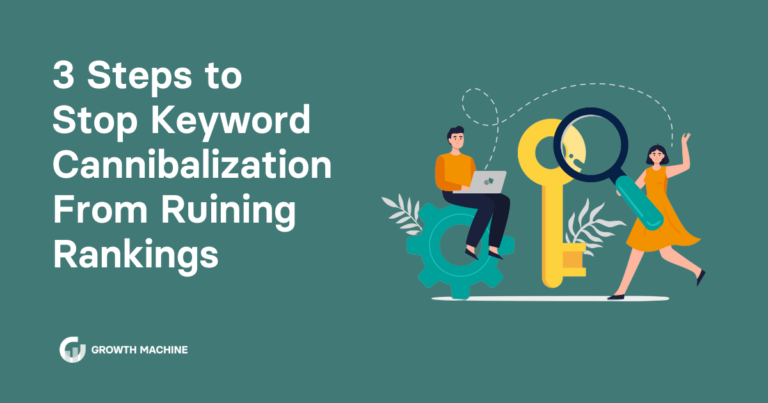7 Things You Need To Know About SEO (They’re Not What You Think)
Search engine optimization (SEO) is a vital part of any overall marketing strategy. As Growth Machine CEO Nora Schlesinger puts it, “If you ignore SEO, you are doing yourself — and your business — a disservice” by leaving leads on the table.
While some marketing professionals limit their content focus to social media posts, newsletter issues, or podcast episodes, SEO is a powerful channel no business owner can afford to overlook. That said, the realm of SEO is often misunderstood, which can lead to underperforming sites and content that doesn’t attract the traffic needed to scale your business.
In the season finale of the Growth Machine Marketing Podcast, CEO Nora Schlesinger talks with Marketing Manager Amanda Natividad on every lesson she wishes business owners understood about SEO, and clears up several misconceptions within the industry.
1. SEO Is a Marathon, Not a Sprint
Here’s a glaring disclaimer no business owner likes to hear: SEO requires a lot of patience upfront.
At Growth Machine, we advise clients to expect a 6-8 month waiting period before seeing results. Investing in SEO doesn’t have a quick return, and traffic changes seen within the first few months are usually just leading indicators — not hard results.
Now, for the good news: Once you’ve established your SEO momentum, it’s the gift that keeps on giving. If you’ve done your keyword research, written quality content to support those keywords, and established authority in your given area of expertise, you can expect traffic to keep flowing to your website.
After six months of momentum, you may be able to reduce your content output from 2-3 posts per week to just one new post per week — without seeing a decrease in traffic.
2. The First Page of Google Isn’t the Only Way to Get Results
The first page of Google is, without question, the most coveted piece of real estate on the internet. Research suggests the first page of Google captures 71% of search traffic clicks (with some estimates pushing that figure up to 92%).
But here’s what every business owner should understand: The first page of Google isn’t the only avenue toward increased traffic. The goal of your SEO strategy should be to create a repository of high-quality content, some of which will rank on the first page, and some of which will not. While some blog posts may land a prized spot within top 10 search results, supporting articles that hold a place on the second or third page of Google help increase the overall authority of your website.
Also, high-ranking blog posts may help capture new visitors, but it’s the overall quality of the content that keeps those visitors on the site and coming back for more. In other words, while someone might arrive on your site due to a top-three-position blog post, they will remain on (or return to) your site to browse through your content library if it provides helpful, valuable information.
3. Google’s the One in Control
When diving into a new SEO strategy, you need to manage expectations, particularly within those first 6-8 months. Why? Because Google — not you or your SEO consultant — is the one calling the shots.
Many clients approach a new SEO strategy with questions such as, “How long will it take these posts to rank?” “How do we gauge success?” “What kind of conversions can we expect?” While these are all legitimate questions, you need to understand that the only entity that truly holds the answers is Google.
While a reputable SEO agency can (and should) provide estimates as to how or when you can see an increase in search traffic, these figures are projections only. And these projections could change on a moment’s notice when Google’s algorithm changes.
That doesn’t mean SEO is akin to throwing spaghetti at the wall and hoping something sticks. A reputable and knowledgeable SEO professional or agency understands that Google’s ultimate goal is, and always will be, to highlight and reward the best quality, most relevant content on the internet, and will guide you toward creating just that.
4. You Need Good Writers to Obtain Good SEO
Many business owners erroneously believe a good SEO strategy is all tech and metrics — but this assumption undervalues quality content. In reality, you cannot have good SEO without good writing.
A good writer should possess three qualities: expertise within the subject matter, understanding of the brand, and human empathy. At Growth Machine, we choose from thousands of writers within all areas of expertise. These writers know what they’re talking about within a given subject, and write content with the purpose of educating the reader. What’s more, they write brand-specific content in order to help convert the reader into a customer.
Lastly, these writers have a high degree of empathy — a quality rarely discussed within SEO agencies. Here’s what that means: The best writers have a keen understanding as to what readers need. They understand which points they need to hit, eliminating anything else that isn’t truly necessary.
5. Your Site Architecture Matters as Much as Your Content Plan
At Growth Machine, sometimes we’ll come across a client website that should, in theory, rank for their given subject matter. They produce quality content, they’re a name-recognizable brand, and they have a strong arsenal of backlinks — and yet, their content is nowhere to be found on Google. In these instances, it’s a clear warning sign that there is a tech-related issue preventing the site from ranking.
These tech-related red flags can be caused by a number of factors, including an index setting, duplicate content, poorly-installed Google Analytics code, or site speed. Google’s Core Web Vitals states that site speed and responsiveness is directly related to the user experience of the website — and a poor user experience, as you might guess, leads to poor SEO.
To test the speed of your web site, use the PageSpeed Insights tool to evaluate any performance and speed issues. Issues including too many images, too many plugins (for WordPress), custom fonts, and too many ads can have a huge impact on site speed, but can be easily remedied to improve your SEO.
6. Content Strategy and SEO Strategy Are Two Different Things
Many times, marketers speak about content and SEO as if they’re synonyms. Instead, we like to think of content and SEO as two sides of a Venn diagram — they overlap in some areas, but remain completely distinct in others.
Within your content plan, there may be certain topics that are valuable to consumers, but simply can’t be optimized for SEO. More often than not, this is because you are a disrupter within your industry. You are providing educational content for a problem, but because the solution is so new, it’s a relatively unknown term in the industry.
Translation: You can’t optimize for a keyword because the keyword doesn’t exist. And that’s fine! It simply shows that you’re a trailblazer in your industry.
7. Always, Always, Always Ask for Help
If there’s one lesson we can leave you with, it’s this: Hire as much help as you can reasonably afford.
You are a subject matter expert within your given industry, but chances are your team’s area of expertise is not SEO. Therefore, it’s in your best interest to hire help so you can tackle those things that you’re not an expert on.
A successful SEO strategy requires both tech and content knowledge, addressing the content plan and site architecture for your company. This is a heavy lift, which is why even Fortune 500 companies don’t employ an in-house SEO team.
Business owners are often led to believe they should “do it all.” But you can’t — and you shouldn’t. Instead, it’s critical to hire a reputable SEO agency with the resources to hire writers within your company’s area of expertise.
At Growth Machine, we’ve helped companies of all sizes go from 0-100,000 monthly visitors in six months and quadruple their traffic in a mere three months. To learn how Growth Machine can help increase traffic for your website, contact us for a free consultation.

